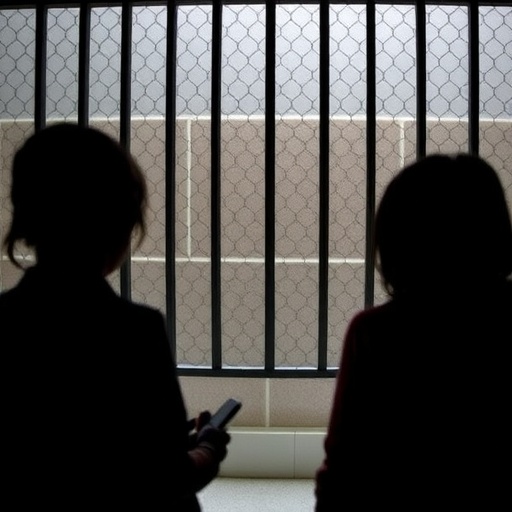A groundbreaking systematic review published in The British Journal of Psychiatry has unveiled the profound psychological damage inflicted on children subjected to immigration detention, unequivocally concluding that no form of detention environment is safe for this vulnerable population. The comprehensive analysis, conducted by a multidisciplinary team of researchers led by the University of Sydney, synthesized data from 21 empirical studies encompassing nearly 10,000 children across eight different countries, offering a rare and expansive insight into the mental health consequences of immigration detention practices worldwide.
The review draws upon clinical psychology, psychiatry, and social sciences to highlight alarming rates of mental health disorders among detained children. Approximately 42% exhibited symptoms of depression, while nearly a third—32%—suffered from post-traumatic stress disorder (PTSD). These statistics illuminate the pervasive trauma that detention invokes, regardless of detention type or geography, thereby challenging policies that continue to use incarceration-like conditions as a means to manage immigration and asylum processes involving minors.
In a world where forced displacement reached an unprecedented scale—with the United Nations High Commissioner for Refugees estimating 122.6 million forcibly displaced persons in 2024, of whom 40% are children—the ethical and public health implications of detaining children are more urgent than ever. Detention centers across at least 80 countries still hold children due to the immigration status of themselves or their families, often subjecting them to environments that exacerbate pre-existing trauma caused by war, persecution, and displacement.
What sets this review apart is its focus on a broad range of detention contexts, from offshore and prolonged forms of custodial confinement to less restrictive, onshore, non-custodial supervision. The analysis reveals that while indefinite and highly restrictive detention settings correlate with the most severe psychological consequences—including heightened incidences of self-harm and suicide attempts—even less severe forms of detention carry significant mental health risks, indicating that the act of detention itself is inherently traumatic to children.
Professor Caroline Hunt, the head of Clinical Psychology at the University of Sydney and senior author of the study, emphasizes the staggering implications: “Detaining children is not merely an administrative or immigration policy matter—it constitutes a global public health emergency. Our findings urgently call for a paradigm shift away from detention towards trauma-informed care and community-based alternatives."
The systematic approach of the review involved meticulous evaluation of studies across diverse regions, examining methodologies ranging from longitudinal cohort studies to cross-sectional mental health assessments. The researchers applied rigorous inclusion criteria to ensure that the data reflected heterogeneous detention experiences and mental health outcomes, thereby producing a robust evidence base that transcends regional policy debates and directly informs clinical, humanitarian, and legal frameworks.
Highlighting recent policy trends, the report contrasts the decline in the number of children in detention in Australia—from hundreds to merely five—owing to legislative reforms with alarming signals from other nations. For instance, news reports suggest a reconsideration by the U.S. government to re-establish juvenile detention centers for unaccompanied immigrant children, underscoring the ongoing global tension between security-driven immigration approaches and child welfare imperatives.
Lead author Isabella Priestley notes that although prolonged offshore detention yields the worst mental health outcomes, even children supervised under community-based, non-custodial restrictions experience psychological harm. This finding destabilizes arguments that less restrictive detention measures are benign or acceptable alternatives, underscoring the universal detrimental impact of detention irrespective of context.
From a neurodevelopmental perspective, prolonged exposure to the stressors of detention—including uncertainty, separation from family or community, and exposure to institutional environments—can disrupt normal brain development patterns in children. These disruptions increase susceptibility to mood disorders, anxiety, and cognitive impairments that may persist into adulthood, necessitating trauma-informed, culturally sensitive intervention strategies aligned with child protection principles.
In light of these findings, the authors urge destination countries such as Australia, the UK, and the US to unequivocally cease the practice of detaining children for immigration control purposes. They advocate for humane immigration policies that prioritize human rights and public health over punitive measures, emphasizing that policy solutions should address root causes of displacement, including war and poverty, rather than reinforcing harmful containment strategies.
The review also highlights the importance of implementing trauma-informed therapeutic frameworks for children and families who have endured detention. Such approaches must integrate cultural competence, accessibility, and family-centred care principles to foster recovery and resilience. Failure to do so risks perpetuating cycles of trauma and intergenerational psychological harm within displaced populations.
This systematic examination was possible through collaboration among leading institutions including the Perth Children’s Hospital, University of Western Australia, Kids Research Institute, Royal Children’s Hospital Melbourne, Murdoch Children’s Research Institute, University of New South Wales, and the Children’s Hospital Westmead Clinical School. This multidisciplinary partnership strengthened the study’s capacity to incorporate clinical expertise, epidemiological rigor, and human rights perspectives.
While several contributors to the research have professional ties or prior engagements with governmental or immigration institutions, all potential conflicts of interest have been transparently disclosed. The research team maintains that these connections have not influenced the study’s objectivity, underscoring the need for independent evidence to guide global immigration and child welfare policy.
Ultimately, this authoritative review raises critical ethical and clinical questions about the continued use of immigration detention involving children. It demands that governments re-evaluate their policies in light of robust scientific evidence, moving towards alternatives that protect the mental health and rights of displaced children globally. The data advocate for a future where no child is confined in detention due to migration status, marking a pivotal moment in the intersection of immigration law, public health, and child psychology.
Subject of Research: People
Article Title: The impact immigration detention on children’s mental health: systematic review
News Publication Date: 10-Apr-2025
Web References:
- https://www.cambridge.org/core/journals/the-british-journal-of-psychiatry/article/impact-of-immigration-detention-on-childrens-mental-health-systematic-review/5999502392197C4867B779D38A3FBF36
- https://www.unhcr.org/refugee-statistics
- https://www.ohchr.org/en/stories/2024/02/un-experts-advocate-end-migrant-children-detention
- https://www.bloomberg.com/news/articles/2025-03-21/trump-administration-plans-detention-centers-for-migrant-children
- https://www.homeaffairs.gov.au/research-and-stats/files/immigration-detention-community-statistics-28-feb-2025.pdf
References:
Priestley, I. et al. (2025). The impact immigration detention on children’s mental health: systematic review. The British Journal of Psychiatry. DOI: 10.1192/bjp.2025.29
Keywords: immigration detention, child mental health, depression, PTSD, systematic review, trauma, asylum seekers, displaced children, public health, trauma-informed care, immigration policy, child welfare




